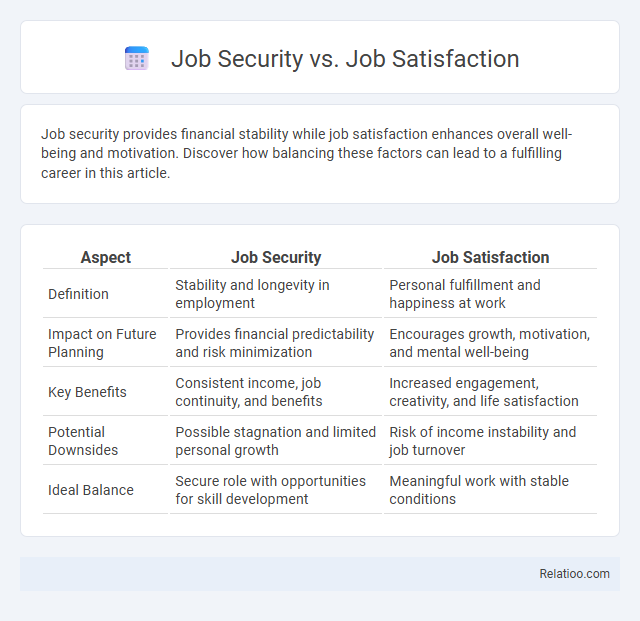Job security provides financial stability while job satisfaction enhances overall well-being and motivation. Discover how balancing these factors can lead to a fulfilling career in this article.
Table of Comparison
| Aspect | Job Security | Job Satisfaction |
|---|---|---|
| Definition | Stability and longevity in employment | Personal fulfillment and happiness at work |
| Impact on Future Planning | Provides financial predictability and risk minimization | Encourages growth, motivation, and mental well-being |
| Key Benefits | Consistent income, job continuity, and benefits | Increased engagement, creativity, and life satisfaction |
| Potential Downsides | Possible stagnation and limited personal growth | Risk of income instability and job turnover |
| Ideal Balance | Secure role with opportunities for skill development | Meaningful work with stable conditions |
Understanding Job Security: Definition and Importance
Job security refers to the stability and continuity of employment, ensuring that Your position is protected against unexpected termination or layoffs. It is crucial for financial stability, reducing stress, and enabling long-term career planning. Understanding job security helps individuals balance their need for steady income with aspirations for job satisfaction and professional growth.
What is Job Satisfaction? Key Factors Explained
Job satisfaction refers to the level of contentment employees feel toward their work, influenced by factors such as meaningful tasks, recognition, and a positive work environment. Key elements contributing to job satisfaction include job autonomy, supportive management, fair compensation, growth opportunities, and work-life balance. Understanding these factors helps individuals and organizations improve employee motivation, retention, and overall productivity.
The Relationship Between Job Security and Job Satisfaction
Job security significantly influences job satisfaction, as employees who feel secure in their positions tend to exhibit higher morale and commitment levels. Research indicates that perceived job security reduces stress and fosters a stable work environment, which enhances overall satisfaction. However, long-term career planning can mediate this relationship by aligning job roles with personal growth opportunities, ensuring both security and fulfillment.
Pros and Cons of Prioritizing Job Security
Prioritizing job security offers stability and predictable income, reducing stress related to financial uncertainty, which benefits long-term planning and family support. However, this focus may limit career growth and personal fulfillment if the role lacks challenges or alignment with true interests, potentially resulting in decreased job satisfaction. Balancing job security with career planning requires assessing the risk of stagnation against the benefits of stable employment in a competitive job market.
Pros and Cons of Focusing on Job Satisfaction
Focusing on job satisfaction enhances employee motivation, creativity, and overall well-being, leading to higher productivity and reduced burnout. However, prioritizing job satisfaction may result in less emphasis on job security, increasing vulnerability during economic downturns or organizational restructuring. Balancing job satisfaction with strategic career planning ensures sustained professional growth and financial stability.
Impact of Economic Conditions on Job Security and Satisfaction
Economic downturns significantly reduce job security by increasing layoffs and company closures, leading to heightened employee anxiety and decreased job satisfaction. Unstable economic conditions force workers to prioritize job security over job satisfaction, often accepting less fulfilling roles to maintain financial stability. Effective career planning requires adaptability and contingency strategies to navigate economic fluctuations while balancing the pursuit of both job security and personal job satisfaction.
Employee Retention: Security vs. Satisfaction
Balancing job security and job satisfaction is crucial for effective employee retention, as employees prioritize stable income alongside fulfilling work environments. Career planning that aligns individual goals with organizational objectives enhances retention by fostering professional growth and engagement. Your company's focus on both security and satisfaction creates a stronger, more committed workforce, reducing turnover and boosting long-term productivity.
How Company Culture Influences Job Satisfaction
Company culture directly impacts job satisfaction by shaping the work environment, communication styles, and employee recognition practices that contribute to Your overall happiness and motivation. A supportive culture that values transparency, inclusivity, and professional growth fosters a sense of belonging and fulfillment, which enhances retention and reduces turnover. When employees feel aligned with their company's values, job satisfaction increases, making career planning more effective and sustainable within the organization.
Strategies for Balancing Job Security and Job Satisfaction
Effective strategies for balancing job security and job satisfaction include continuous skill development to remain competitive while pursuing roles aligned with personal values and interests. Establishing clear career goals enables proactive planning, helping individuals seek stable opportunities that also offer meaningful work experiences. Regularly assessing market trends and organizational changes aids in making informed decisions, ensuring long-term security without compromising job fulfillment.
Choosing Between Job Security and Job Satisfaction: What Matters Most?
Choosing between job security and job satisfaction hinges on individual priorities and long-term goals. Job security offers financial stability and reduced stress during economic downturns, while job satisfaction fosters motivation, creativity, and overall well-being. Integrating career planning helps balance both aspects by aligning personal values with market demands, maximizing professional fulfillment and stability.

Infographic: Job Security vs Job Satisfaction
 relatioo.com
relatioo.com